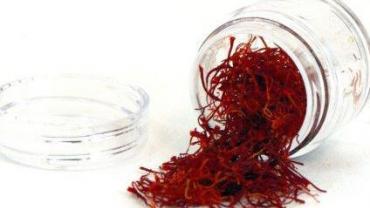
Depression and anxiety disorders are different but many individuals with depression usually experience nervousness irritability and difficulty concentrating. These patients often have a history of anxiety and have both conditions. While they are commonly treated with selective serotonin reuptake inhibitors (SSRIs) some individuals choose to avoid SSRIs because they do not want to take medications. In addition long-term SSRI use can upregulate phosphodiesterase-4 (PDE4) which can reduce the sensitivity of SSRIs in response to treatment.
According to a new study published in Pharmacopsychiatry researchers demonstrated that saffron significantly improved symptoms of depression and anxiety.
In this study 66 patients with major depressive disorder accompanied with anxiety were randomly assigned to receive either saffron (30%mg/day) or the SSRI citalopram (40%mg/day) for 6 weeks. Hamilton Rating Scale for Depression (HAM-D) and Hamilton Rating Scale for Anxiety (HAM-A) were used to assess the efficacy of the study.
As a result patients who received either saffron or citalopram showed significant improvement in scores of the HAM-D and HAM-A. Previous studies have demonstrated saffrons antidepressant and anxiolytic effects in clinical studies. This study further supports the use of saffron for major depressive disorder and anxiety.
Many people experience anxiety in their daily lives. For some individuals it is just a bad passing feeling but for many anxiety controls their daily life to the point of affecting the decisions they make. Anxiety disengages a region of the brain called the prefrontal cortex (PFC) which is critical for flexible decision-making. This is the area that helps us get tasks done.
While millions of people worldwide currently take antidepressants there is a significant amount of research supporting the use of nutritional supplements to improve mental health.
Natural alternatives to antidepressants such as Sceletium tortuosum and saffron flower have attracted increasing attention over the past few decades for promoting a sense of wellbeing and for helping with depression. Numerous studies show saffron flowers positive outcomes on mild clinical depression going head to head with SSRIs and tricyclic antidepressants demonstrating the same efficacy.
Sceletium tortuosum has been used for hundreds of years for stress and relaxation. It acts as a natural SSRI and PDE4 inhibitor and therefore has a synergistic effect on the central nervous system and a broader therapeutic effect than an SSRI alone. This botanical has another advantage in that it is not contraindicated with other nutrients such as St. Johns wort 5-HTP and SAME. These botanicals can all be used in conjunction with L-5-MTHF and vitamin B12 to help improve mood decrease anxiety and support individuals with depression.
Fish oil supplementation is also essential for patients suffering from depression. Numerous studies have demonstrated the benefits of fish oil supplements for overall brain and cognitive health.
By Michael Jurgelewicz DC DACBN DCBCN